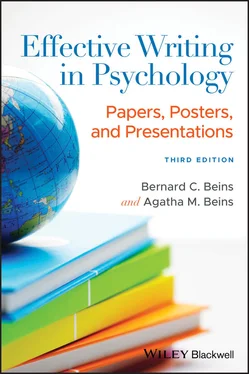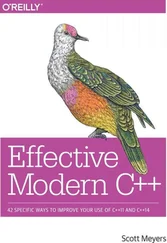Bernard C. Beins - Effective Writing in Psychology
Здесь есть возможность читать онлайн «Bernard C. Beins - Effective Writing in Psychology» — ознакомительный отрывок электронной книги совершенно бесплатно, а после прочтения отрывка купить полную версию. В некоторых случаях можно слушать аудио, скачать через торрент в формате fb2 и присутствует краткое содержание. Жанр: unrecognised, на английском языке. Описание произведения, (предисловие) а так же отзывы посетителей доступны на портале библиотеки ЛибКат.
- Название:Effective Writing in Psychology
- Автор:
- Жанр:
- Год:неизвестен
- ISBN:нет данных
- Рейтинг книги:3 / 5. Голосов: 1
-
Избранное:Добавить в избранное
- Отзывы:
-
Ваша оценка:
- 60
- 1
- 2
- 3
- 4
- 5
Effective Writing in Psychology: краткое содержание, описание и аннотация
Предлагаем к чтению аннотацию, описание, краткое содержание или предисловие (зависит от того, что написал сам автор книги «Effective Writing in Psychology»). Если вы не нашли необходимую информацию о книге — напишите в комментариях, мы постараемся отыскать её.
Effective Writing in Psychology: Papers, Posters, and Presentations
Effective Writing in Psychology's
Effective Writing in Psychology: Papers, Posters, and Presentations
Effective Writing in Psychology — читать онлайн ознакомительный отрывок
Ниже представлен текст книги, разбитый по страницам. Система сохранения места последней прочитанной страницы, позволяет с удобством читать онлайн бесплатно книгу «Effective Writing in Psychology», без необходимости каждый раз заново искать на чём Вы остановились. Поставьте закладку, и сможете в любой момент перейти на страницу, на которой закончили чтение.
Интервал:
Закладка:
Second, if you want to communicate effectively, you should make sure that your grammar is flawless and that your selection of words is judicious. When your writing is technically competent, your reader will not be distracted from your message by having to figure out what you mean. You also need to go back to your work to edit and revise it. It helps to re‐read your work when it is not fresh in your own mind; sometimes you can spot problems that were not initially apparent. In addition, your writing may benefit if you ask somebody to read your work and explain to you what is unclear. Mark Twain recognized the importance of revising one's work: “The time to begin writing an article is when you have finished it to your satisfaction. By that time, you begin to clearly and logically perceive what it is you really want to say” (Writing, n.d.).
Finally, it is important to remember that even lengthy manuscripts begin with a single sentence. In order to maximize the effectiveness of your writing, you should set up a schedule and a process. B. F. Skinner is a good example; he was an early bird, so he arose and did his writing for a few hours in the morning, a practice that he continued right up until his death.
How to Begin
Find a place where you can concentrate free of distraction, at a time when you are clear‐headed. If you are a night owl, that may be the best time for you to write; if you are an early‐morning lark, that would be a good time. In either case, you should establish a routine. Writing does not happen until you do it. And when you develop your routine, remember to positively reinforce yourself. Identify a goal for your writing session and reward yourself when you reach it. So you might decide to explore and write about a given topic for 30 minutes. After 30 minutes, you should reward yourself with a break.
You may need to shape your behavior first, though, so you might need to start with a shorter work period, gradually extending it until you identify the longest period of time during which you can write effectively. Psychologists have identified a phenomenon called post‐reinforcement pause . It refers to a period of time after a reinforcement when the animal (including the human animal) stops working toward another reinforcement (Felton & Lyon, 1966). You should make sure that your post‐reinforcement pauses are not too lengthy.
By developing good writing habits, you will have taken the first step toward successful communicating. The task is often not easy, but the results are eminently satisfying.
In the next chapters, we will explore how you can develop your ideas, connect them to what others have already written, and express them in a style that reflects a sophisticated knowledge of psychology. In the end, you will have an impact on your audience when you write and when you speak about psychology.
2 Formulating Your Ideas
It is not the answer that enlightens, but the question.
Eugene Ionesco
Somewhere, something incredible is waiting to be known.
Carl Sagan
Identifying Your Focal Question
You have a paper due in two weeks but have not started doing research. Perhaps you have not yet decided what to write about. Where do you begin? How do you move from assignment instructions to article databases and to your argument? The purpose of this chapter is to offer guidance and guidelines for developing a research paper topic and thesis. We offer suggestions to help you identify a topic, use sources to narrow the topic, and develop your thesis in a way that reflects academic standards.
When you start a psychology writing assignment, you might already have a specific question you want to answer or a specific set of studies to evaluate. However, if you need to generate your own idea, how do you choose an appropriate topic with an appropriate focus? First, examine the writing project parameters closely. What is the purpose of the project? What objectives do you need to achieve? Who is your audience? After reflecting on these questions, you can go about narrowing your scope and developing a question through pre‐research and preliminary research before turning to focused research .
Pre‐research refers to research you do before you have a focal question or even a general topic for your writing project. Preliminary research comprises activities that help you narrow your focus once you have a general idea and give you background information on your topic. Journal of Comparative Psychology , Wikipedia, https://www.childstats.gov, and The New York Times can all be useful sources for preliminary research. Perhaps you will be watching the evening news on TV, sitting in class, reading a billboard sign, or overhearing a conversation when an interesting question strikes you. Because an idea that initially does not seem feasible might end up being the subject of an innovative thesis statement, we suggest that you initially cast as broad a net as possible and that you do some preliminary research before you commit to or discard a topic. Once you identify a viable focus for your writing project through pre‐research and preliminary research, the next step is focused research, or the work involved in reading and evaluating sources that you plan to incorporate into your paper.
Although these three types of research seem distinct, the differences between them blur during the research and writing process. You will probably move back and forth between pre‐research and preliminary research as you identify and narrow your focus. Furthermore, you may not use all the sources you find through focused research in developing and supporting your argument and may have to return to the library or article databases to find additional sources. Table 2.1outlines distinctions between these three kinds of research to give you a better sense of their purpose.
Table 2.1 Different Kinds of Research
| Kind of research | Purpose | Activities |
|---|---|---|
| Pre‐research | To help choose a paper topic | Brainstorming lists of possible topics |
| To give you general information about potential topics | Skimming through popular and scholarly sources to determine if there has been enough research related to a potential research topic | |
| Slowly narrowing your focus to one or a few research questions about one topic | ||
| Preliminary research | To gather a broad range of information about a particular topic | Choosing the questions that seem the most viable as research topics |
| To determine what research questions have and have not been asked | Reading through scholarly sources to familiarize yourself with other research related to these topics | |
| To narrow your focus and start formulating a thesis | A combination of skimming sources and reading them more closely | |
| Taking notes as you read sources | ||
| Focused research | To give you in‐depth knowledge about a particular research topic | Reading scholarly sources that you plan on using in your paper and evaluating the sources' strengths and limitations |
| To help you develop and support your thesis statement | Reading sources closely and taking notes on the ideas in that source | |
| To find sources that offer a variety of perspectives on your topic | Keeping track of citation information for each source |
In the preliminary research stage, you start establishing your focus and considering the academic value of your research questions and claims. The focus is the scope of your paper and is shaped by the assignment guidelines, how broadly can you explore the topic, and your intended audience. Each of these aspects will affect how you approach your writing. For example, the focus of a paper about communication between identical twins will be different for a 10‐page and a 20‐page paper; if you are writing about the topic for an encyclopedia, a class project, or The American Journal of Psychology ; or if you are reporting your own original research or analyzing others' research.
Читать дальшеИнтервал:
Закладка:
Похожие книги на «Effective Writing in Psychology»
Представляем Вашему вниманию похожие книги на «Effective Writing in Psychology» списком для выбора. Мы отобрали схожую по названию и смыслу литературу в надежде предоставить читателям больше вариантов отыскать новые, интересные, ещё непрочитанные произведения.
Обсуждение, отзывы о книге «Effective Writing in Psychology» и просто собственные мнения читателей. Оставьте ваши комментарии, напишите, что Вы думаете о произведении, его смысле или главных героях. Укажите что конкретно понравилось, а что нет, и почему Вы так считаете.












